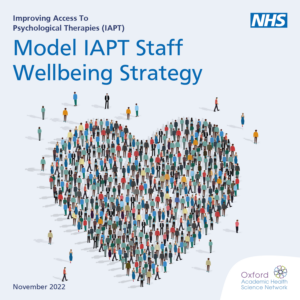The Oxford AHSN and NHS partners today publish a wellbeing strategy to support staff working in talking therapies (IAPT) services.
In the face of increased workplace pressures during the pandemic, the IAPT services in Berkshire, Oxfordshire, Buckinghamshire and Milton Keynes worked together on the Model Staff Wellbeing Strategy to strengthen service resilience and staff support.
The strategy, funded and supported by NHS England, has been designed by and for IAPT staff, drawing on many workplace conversations. It aims to reduce workplace stress and burnout, enable staff to thrive and help to address recruitment and retention challenges. It is based on a wealth of secondary research and practice relating to organisational development and workplace wellbeing and can be implemented by other IAPT services – or adapted to support staff in other areas of health and social care. The strategy focuses on four key areas:
- Leading with compassion
- Managing collaboratively
- Team-working effectively
- Belonging for, and by, all
It includes lots of practical evidence-based suggestions on how to organise and run services in ways that benefit both patients and staff, as well as chiming with the NHS People Promise.
The strategy is launched today at an NHS England national webinar for IAPT services hosted by Hayley Matthews, national IAPT Programme Manager, and including a contribution by Professor David M Clark, National Clinical and Informatics Advisor for IAPT.
The four NHS IAPT services which contributed to the strategy through the Oxford AHSN Anxiety and Depression (A&D) Network are:
- Talking Therapies, Berkshire (Berkshire Healthcare NHS Foundation Trust)
- Talking Space Plus, Oxfordshire (Oxford Health NHS Foundation Trust)
- Healthy Minds, Buckinghamshire (Oxford Health)
- Talking Therapies, Milton Keynes (Central and North West London NHS Foundation Trust)
The Chief Executives of all three trusts are quoted at the front of the strategy.
Claire Murdoch, CEO of Central and North West London and national Mental Health Director at NHS England, said: “Our IAPT colleagues provide such a skilled and important service and it is vital that we understand, share and implement best practice, in supporting them to stay healthy, well and effective.”
Dr Nick Broughton, CEO of Oxford Health and a member of the Oxford AHSN Board, said: “The pandemic not only highlighted the importance of IAPT services but also the need to proactively support the wellbeing of staff working in such services. It is essential that we do this if we are to have services that are resilient and sustainable.”
Julian Emms, CEO of Berkshire Healthcare, said: “Our staff are our most important asset and supporting them to be healthy and well at work is of upmost importance to us.”
A member of the Oxford AHSN Anxiety and Depression (A&D) Network’s patient forum said: “Any initiatives which support the wellbeing of IAPT professionals should be welcomed and encouraged, given the invaluable support they, in turn, provide to thousands of patients each year battling with their own anxieties and issues.”
The Model IAPT Staff Wellbeing Strategy and accompanying resources are available here: https://bit.ly/IAPTwellbeing


